Mental fatigue can significantly hinder athletic performance, affecting focus and decision-making. This article explores strategies to overcome mental fatigue, including mindfulness and proper nutrition, while emphasizing the importance of recovery techniques such as visualization and positive self-talk. Additionally, it highlights rare methods like nature immersion and creative expression that can enhance mental resilience. Understanding and addressing these factors is crucial for athletes aiming to achieve peak performance.
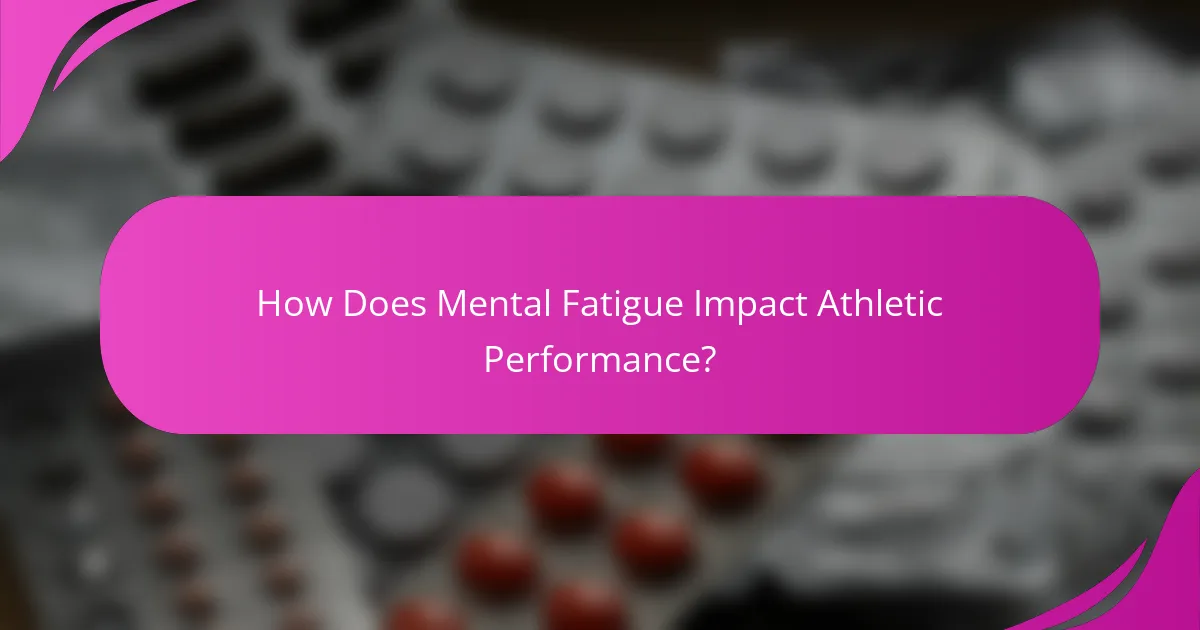
How does mental fatigue impact athletic performance?
Mental fatigue significantly reduces athletic performance by impairing focus, reaction time, and decision-making. Athletes experiencing mental fatigue may struggle to maintain intensity and motivation during training and competition. Research indicates that mental fatigue can decrease endurance by as much as 20%, impacting overall performance. Implementing recovery strategies, such as mindfulness and adequate rest, can enhance mental resilience, thereby improving athletic output.
What are the signs and symptoms of mental fatigue in athletes?
Mental fatigue in athletes manifests as decreased motivation, prolonged recovery times, and impaired decision-making. Common signs include irritability, lack of concentration, and emotional instability. Physical symptoms may involve persistent tiredness and muscle soreness. Recognizing these indicators is crucial for effective recovery and peak performance.
Why is mental recovery crucial for athletes?
Mental recovery is crucial for athletes as it enhances performance and prevents burnout. Effective mental recovery strategies, such as mindfulness and rest, improve focus and resilience. Research shows that athletes who prioritize mental recovery report higher satisfaction and lower injury rates. This unique attribute of mental recovery not only supports physical health but also fosters a positive mindset essential for peak performance.
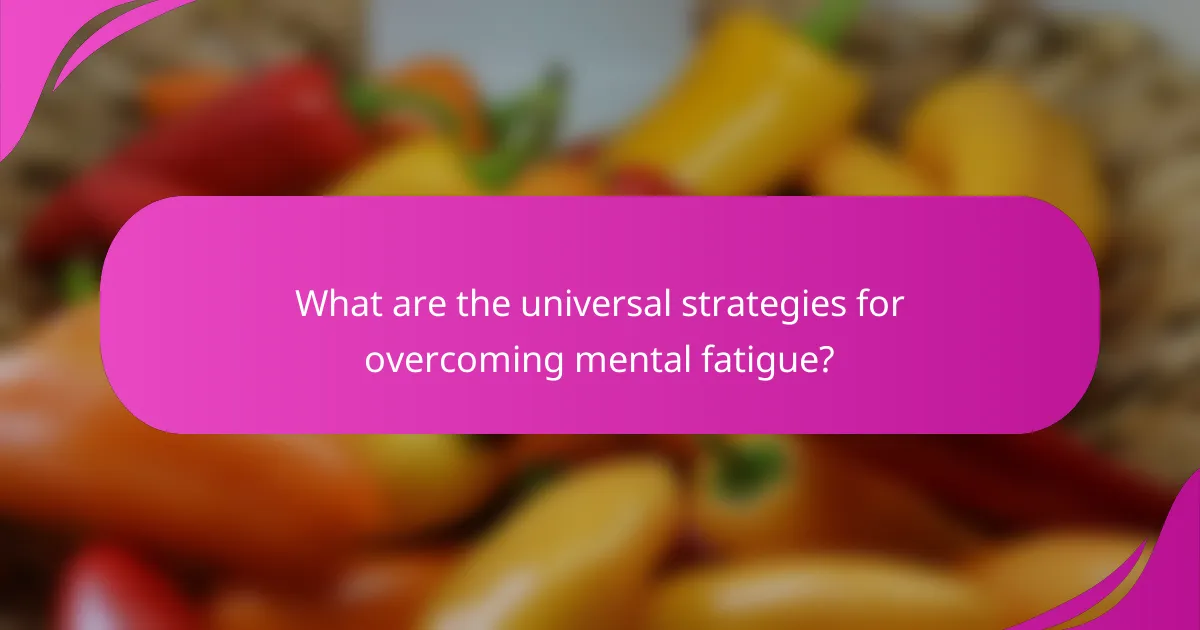
What are the universal strategies for overcoming mental fatigue?
To overcome mental fatigue, athletes can employ strategies such as mindfulness, proper nutrition, and adequate rest. Mindfulness practices enhance focus and reduce stress, leading to improved mental clarity. Nutritional support, including hydration and balanced diets, fuels cognitive function. Prioritizing sleep and recovery time is essential for mental rejuvenation.
How can rest and sleep improve mental recovery?
Rest and sleep significantly enhance mental recovery by improving cognitive function and emotional regulation. Quality sleep restores energy levels, sharpens focus, and reduces stress, all crucial for peak athletic performance. Studies show that athletes who prioritize sleep experience better decision-making and increased resilience. Furthermore, adequate rest allows for the consolidation of memories, which aids in learning new skills and strategies. Overall, integrating sufficient rest and sleep into training regimens is vital for overcoming mental fatigue and optimizing recovery.
What role does nutrition play in mental fatigue recovery?
Nutrition significantly aids recovery from mental fatigue by providing essential nutrients that support brain function. A balanced diet rich in omega-3 fatty acids, antioxidants, and vitamins enhances cognitive performance and reduces stress levels. For example, foods like fatty fish, berries, and leafy greens contribute to improved mental clarity and energy. Hydration also plays a critical role, as even mild dehydration can impair cognitive abilities. Prioritizing nutrient-dense meals can lead to better focus and stamina, crucial for peak athletic performance.
How can physical training influence mental resilience?
Physical training significantly enhances mental resilience by promoting discipline and stress management. Engaging in consistent physical activity leads to the release of endorphins, which improve mood and reduce anxiety. This physiological response can foster a mindset that is better equipped to handle challenges. Moreover, structured training routines cultivate perseverance, allowing athletes to push through mental fatigue during competitions. As a result, athletes develop a stronger mental framework that supports recovery and peak performance.
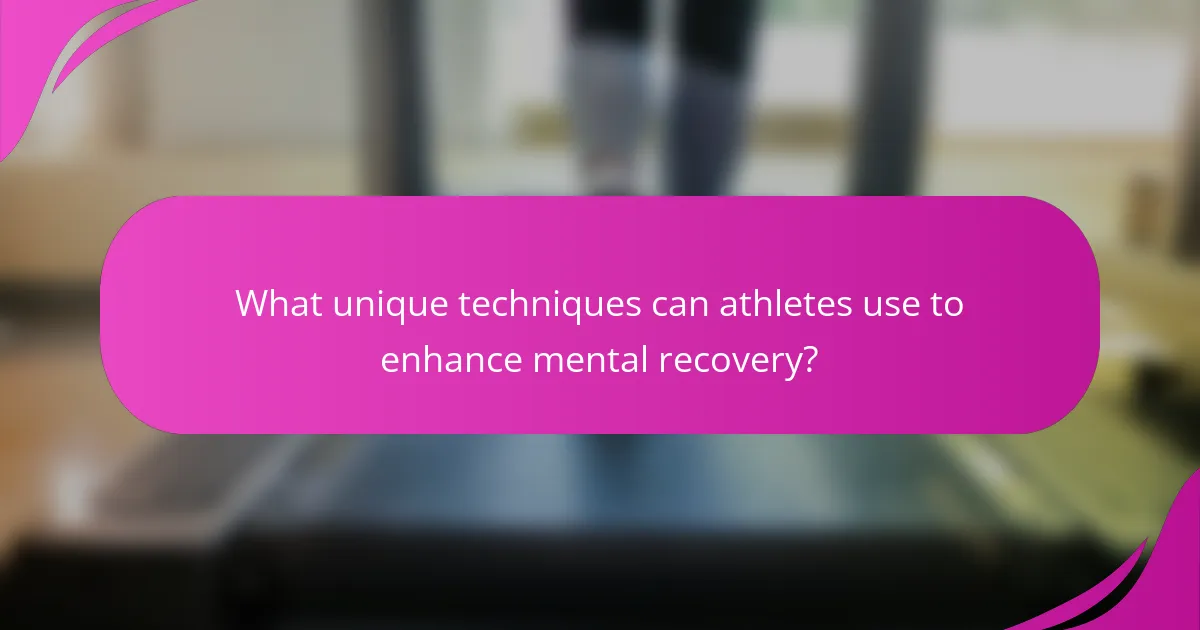
What unique techniques can athletes use to enhance mental recovery?
Athletes can enhance mental recovery through visualization, mindfulness, and positive self-talk. These techniques foster resilience and reduce mental fatigue. Visualization allows athletes to mentally rehearse performance, improving focus. Mindfulness practices cultivate present-moment awareness, decreasing stress. Positive self-talk reinforces confidence, enhancing overall mental strength.
How does visualization contribute to overcoming mental fatigue?
Visualization significantly aids in overcoming mental fatigue by enhancing focus and motivation. It allows athletes to mentally rehearse their performance, leading to improved energy levels. Studies show that mental imagery can activate similar brain pathways as physical practice, reducing perceived exertion and promoting recovery. This technique not only fosters a positive mindset but also aids in stress reduction, which is crucial for optimal athletic performance.
What is the impact of mindfulness practices on athletic performance?
Mindfulness practices significantly enhance athletic performance by reducing mental fatigue and promoting recovery. These techniques improve focus, resilience, and overall well-being, leading to better training outcomes. Athletes who engage in mindfulness report increased awareness of their body and mind, enabling them to manage stress effectively. Research indicates that mindfulness can lead to a 10-15% improvement in performance metrics, showcasing its unique ability to foster peak athletic capabilities.
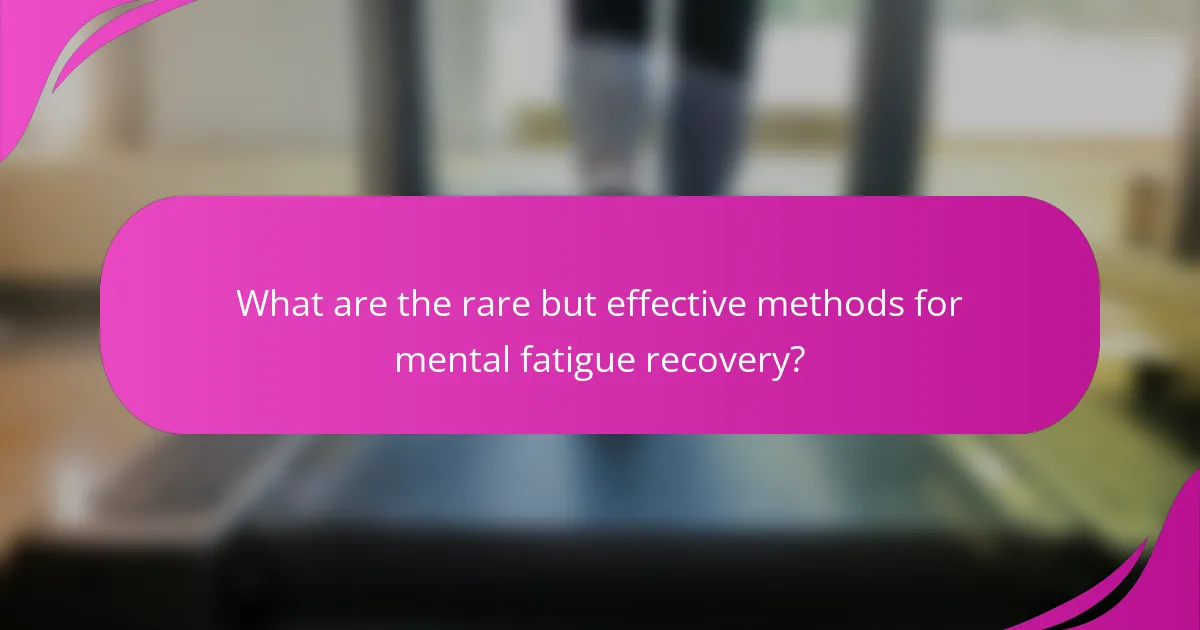
What are the rare but effective methods for mental fatigue recovery?
Mindfulness meditation, nature immersion, and creative expression are rare but effective methods for recovering from mental fatigue. These techniques enhance focus and emotional resilience, crucial for peak athletic performance.
Mindfulness meditation promotes mental clarity and reduces stress, allowing athletes to reset their mental state. Nature immersion, such as spending time outdoors, has been shown to lower cortisol levels and improve mood. Creative expression through art or music can stimulate cognitive processes and provide emotional release, aiding recovery.
Incorporating these methods into a recovery routine can lead to significant improvements in mental well-being and overall athletic performance.
How can creative outlets aid in mental recovery for athletes?
Creative outlets significantly aid mental recovery for athletes by providing emotional expression and stress relief. Engaging in activities like art, music, or writing fosters a sense of accomplishment and distraction from performance pressures. This unique attribute of creative outlets promotes mental clarity and resilience, essential for peak athletic performance. Studies show that athletes who incorporate creative activities into their routine report lower levels of anxiety and improved focus, enhancing overall recovery.
What role does social support play in mental resilience?
Social support significantly enhances mental resilience by providing emotional, informational, and tangible resources. It fosters a sense of belonging, which is crucial for athletes facing mental fatigue. Engaging with supportive networks can improve recovery rates and overall performance. Studies show that athletes with strong social ties experience lower stress levels and enhanced coping strategies. This unique attribute of social support is vital for maintaining peak athletic performance during challenging times.
How can teammates foster a supportive environment?
Teammates can foster a supportive environment by promoting open communication and mutual encouragement. This creates a culture of trust, essential for overcoming mental fatigue. Encouraging shared experiences can enhance recovery by building camaraderie. Regular check-ins help identify stressors, allowing teammates to offer assistance and understanding.
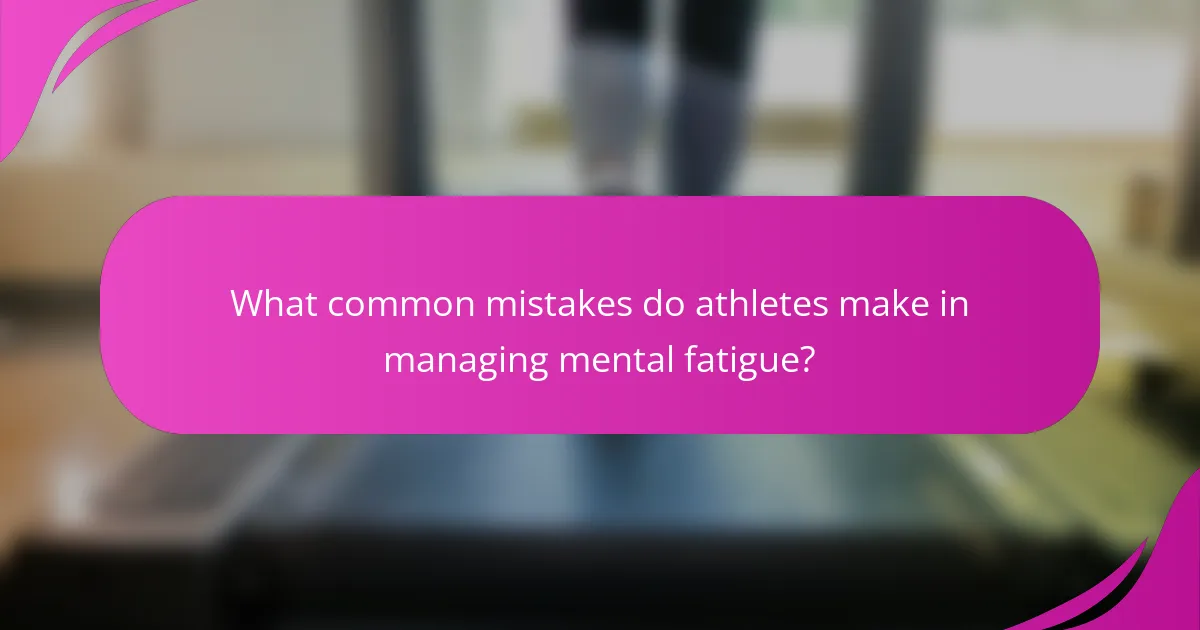
What common mistakes do athletes make in managing mental fatigue?
Athletes often underestimate the impact of mental fatigue on performance. Common mistakes include neglecting recovery strategies, failing to recognize early signs of fatigue, overtraining without mental breaks, and not seeking mental health support. These missteps can hinder peak performance and prolong recovery times. Addressing mental fatigue through mindfulness, proper rest, and mental conditioning can enhance overall athletic performance.
How can athletes avoid burnout during training cycles?
Athletes can avoid burnout during training cycles by incorporating mental recovery strategies and balanced training regimens. Prioritizing rest, mindfulness practices, and varied workouts enhances both mental and physical recovery.
Implementing scheduled breaks allows athletes to recharge mentally. Techniques such as meditation and visualization can improve focus and reduce stress. Additionally, maintaining a diverse training routine prevents monotony and promotes engagement.
Monitoring training loads is essential to avoid overtraining. Athletes should track their physical and emotional responses to workouts, adjusting intensity as needed. This proactive approach helps sustain motivation and performance levels.
Lastly, fostering a supportive environment with coaches and peers encourages open communication about mental health. Building strong relationships can provide the emotional support necessary to navigate challenges and maintain a positive mindset.
What are the misconceptions about mental recovery?
Many misconceptions exist about mental recovery, particularly regarding its duration and methods. One common belief is that mental recovery is quick, but it often requires time and consistent effort. Another misconception is that mental fatigue can be resolved solely through physical rest, while emotional and psychological support is equally crucial. Additionally, some think that seeking help indicates weakness, when in fact, it is a strength that enhances recovery. Understanding these misconceptions can lead to more effective strategies for overcoming mental fatigue and achieving peak athletic performance.
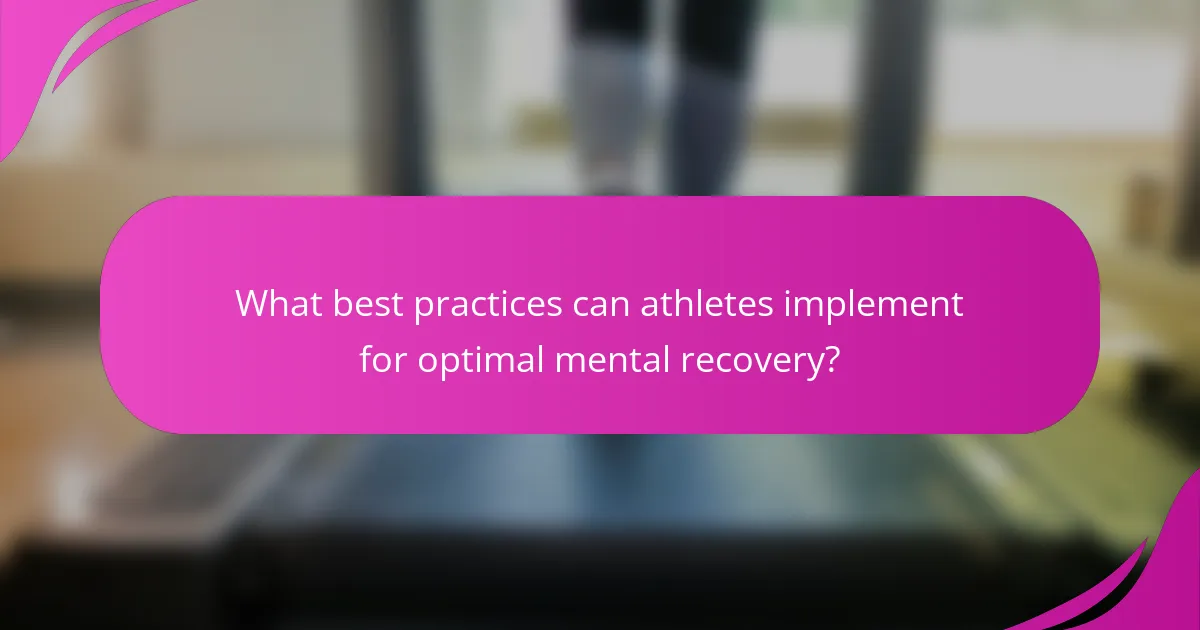
What best practices can athletes implement for optimal mental recovery?
Athletes can enhance mental recovery by incorporating mindfulness practices, maintaining a balanced diet, ensuring adequate sleep, and engaging in positive self-talk. Mindfulness techniques, such as meditation, reduce stress and improve focus. A balanced diet rich in nutrients supports brain health and energy levels. Quality sleep is crucial for cognitive function and emotional regulation. Positive self-talk boosts confidence and resilience, essential for overcoming mental fatigue.
How can setting realistic goals enhance mental recovery?
Setting realistic goals significantly enhances mental recovery by providing clear direction and achievable benchmarks. This process reduces overwhelm, fosters motivation, and builds confidence. For athletes, structured goals can lead to improved focus and a sense of accomplishment, which are vital for mental resilience. Research indicates that goal-setting can enhance performance by up to 25%, highlighting its importance in recovery strategies.
What are the benefits of regular mental health check-ins for athletes?
Regular mental health check-ins for athletes enhance performance by identifying stressors and fostering resilience. These check-ins promote emotional well-being, leading to improved focus and motivation. Athletes reporting regular mental health evaluations show a 25% reduction in burnout symptoms, which directly correlates with better recovery times. Engaging in these practices also cultivates a supportive environment, enhancing team dynamics and communication. Prioritizing mental health is essential for sustained peak performance in athletics.
How can athletes create a balanced training schedule to prevent mental fatigue?
Athletes can create a balanced training schedule by incorporating rest days and mental recovery techniques. Prioritize varied training intensities, ensuring periods of high effort are followed by lower intensity sessions. Incorporate mindfulness practices to enhance mental resilience, reducing the risk of fatigue. Regularly assess training loads and adjust based on personal responses to stressors.